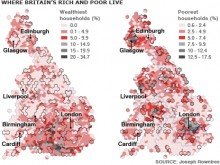New research published today by JRF leaves us wondering whether there is enough political will to fix the broken housing market.
Last week saw a new housing minister, Mark Prisk, and a welcome new wave of housing announcements. With a promised £10 billion of Government guarantees to fund new homes there’s a palpable sense of renewed hope despite the latest poor construction figures. The Government’s plan to boost house building, jobs and the economy shows that they’re serious about housing’s role in economic recovery.
But how serious are they about fixing the underlying problems in the housing market?
Last November’s housing strategy noted that:
The current challenging economic and financial circumstances make action on housing even more important – both to tackle immediate pressures now and to lay the foundations for stronger growth and stability in the future.
We asked then whether the strategy went far enough to create housing market stability from a volatile base and found it lacking. Looking at policy developments over the last year, that view still stands.
We all appreciate the importance of increasing housing supply from the current historically low levels. New building is less than half what we need to meet demand. It’s this shortage of housing and sluggish housing supply that exposes us to such a boom and bust housing market, but it isn’t the whole story.
A more stable housing market would offer more certainty for everyone, whether renters or owners, developers, landlords or lenders, let alone helping employers and employees. Who wouldn’t want that?
The question is how to get there. In the long run, increasing housing supply is obviously crucial but it won’t come quick enough or on a large enough scale to make a difference any time soon. In the shorter term we need to use the tools we already have, like property taxation, to create a more stable housing market.
The problem is the lack of political will. This is not something that one party can do alone; we need cross party support to make such fundamental property tax reform work.
Of course a big issue like property tax reform needs sensitive handling. It’s almost as much about the political signals that get sent as the reform itself.
The first step would be for all parties to send a signal that council tax would be re-valued during the next parliament. The next would be to move to a point value system, which on average would be 0.6 per cent of a property’s value. Then you could move in stages to a national property tax system by adjusting central Government grant. This would act as a check on house prices. Property taxes would increase when prices were rising and fall when prices were dropping.
I really welcome the supply side stimulus we saw last week but I would like to see more political will to tackle the boom and bust. With the Organisation for Economic Cooperation and Development (OECD) noting that property taxes are least harmful to growth, surely the current economic context is the perfect time to fix the housing market?
Phased in while prices are stable, we would have a new property tax system that would bring stability to the market. That’s a move that would benefit everyone.







